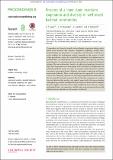Presence of a loner strain maintains cooperation and diversity in well-mixed bacterial communities
Abstract
Cooperation and diversity abound in nature despite cooperators risking exploitation from defectors and superior competitors displacing weaker ones. Understanding the persistence of cooperation and diversity is therefore a major problem for evolutionary ecology, especially in the context of well-mixed populations, where the potential for exploitation and displacement is greatest. Here we demonstrate that a “loner effect”, described by economic game theorists, can maintain cooperation and diversity in real-world biological settings. We use mathematical models of public-good-producing bacteria to show that the presence of a loner strain, which produces an independent but relatively inefficient good, can lead to rock-paper-scissor dynamics, whereby cooperators outcompete loners, defectors outcompete cooperators, and loners outcompete defectors. These model predictions are supported by our observations of evolutionary dynamics in well-mixed experimental communities of the bacterium Pseudomonas aeruginosa. We find that the coexistence of cooperators and defectors, which respectively produce and exploit the iron-scavenging siderophore pyoverdine, is stabilized by the presence of loners with an independent iron-uptake mechanism. Our results establish the loner effect as a simple and general driver of cooperation and diversity in environments that 40 would otherwise favour defection and the erosion of diversity.
Citation
Inglis , R , Biernaskie , J , Gardner , A & Kümmerli , R 2016 , ' Presence of a loner strain maintains cooperation and diversity in well-mixed bacterial communities ' , Proceedings of the Royal Society B: Biological Sciences , vol. 283 , no. 1822 . https://doi.org/10.1098/rspb.2015.2682
Publication
Proceedings of the Royal Society B: Biological Sciences
Status
Peer reviewed
ISSN
0962-8452Type
Journal article
Collections
Items in the St Andrews Research Repository are protected by copyright, with all rights reserved, unless otherwise indicated.

